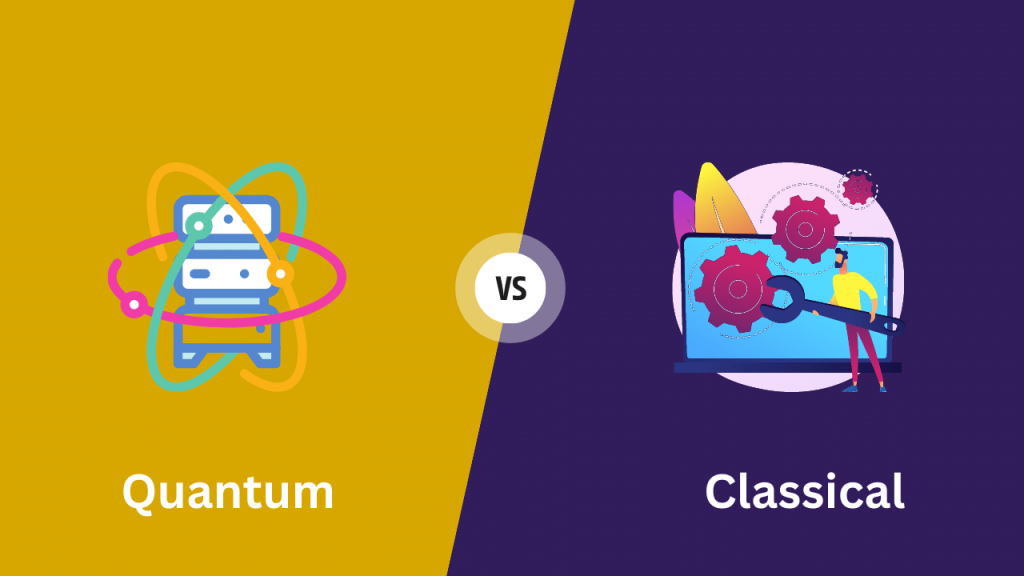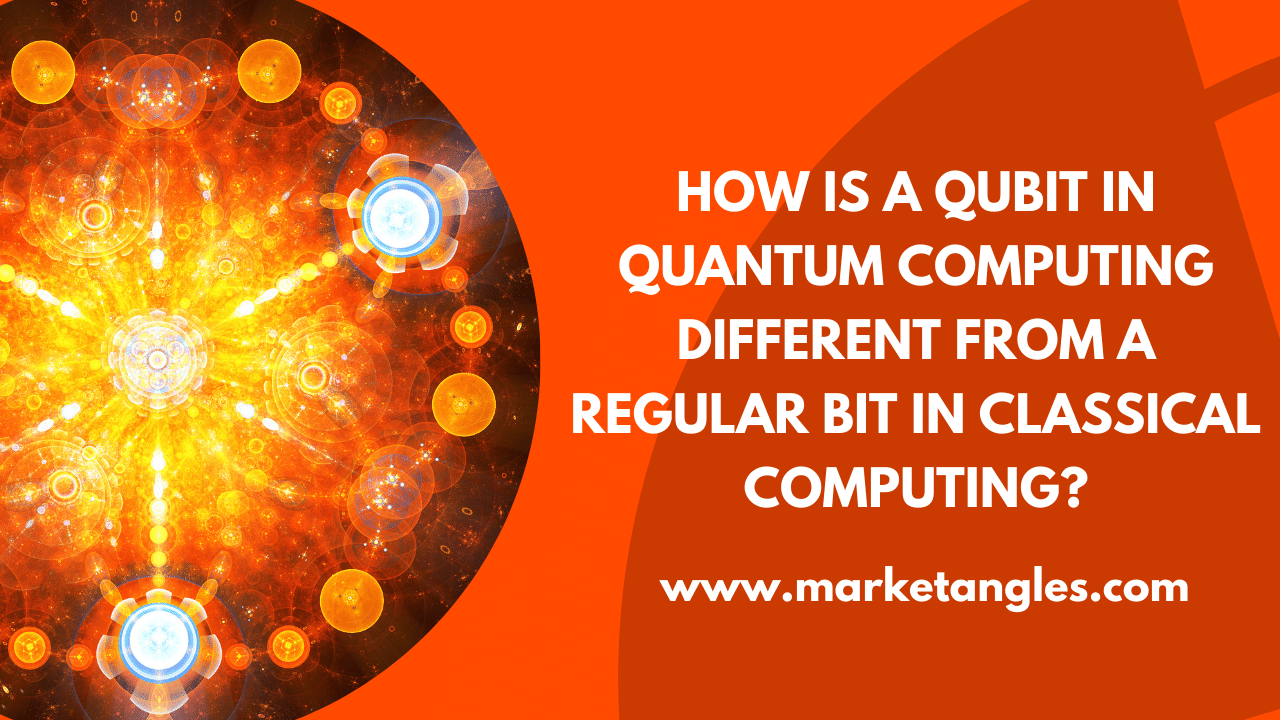Quantum computing is ushering in a new era of processing power, primed to solve complex problems far beyond the scope of current classical computers. At the heart of this revolution is the qubit, a unit of quantum information that transcends the boundaries of classical bits. But how is a qubit in quantum computing different from a regular bit in classical computing? Let’s dive in.
1. Quantum Computing vs. Classical Computing: Setting the Stage

Classical computers use bits as their basic unit of information, represented by a 0 or a 1. The simple binary system has served us well, allowing us to build advanced computational systems that have driven our digital age. However, this binary framework is not without limitations. Complex problems like simulating quantum systems or factoring large numbers can be computationally challenging or even impossible for classical computers. Enter quantum computing.
2. Qubit Explanation and Comparison: Quantum Supremacy
Unlike classical bits, qubits can exist in multiple states at once, thanks to a quantum phenomenon known as superposition. A qubit can be in a state representing 0, a state representing 1, or any combination of both. This feature allows quantum computers to handle exponentially more information, leading to faster problem-solving capabilities and hence, quantum supremacy.
3. Quantum Superposition and Classical States: A World of Difference
In a classical bit, the state is either 0 or 1— never both. However, a qubit leverages quantum superposition, meaning it can be both 0 and 1 simultaneously. This dual-state existence amplifies quantum computing’s power, opening doors to a realm of computational possibilities.
4. Quantum Entanglement vs. Classical Correlation: The Game Changer
Quantum entanglement, another key feature that sets qubits apart, is a uniquely quantum mechanical resource. Entangled qubits are deeply linked, such that the state of one instantaneously influences the state of the other, no matter the distance. This feature allows for highly sophisticated, parallel computing processes that are far beyond the capabilities of classical correlation.
5. Quantum Parallelism and Classical Sequential Processing: A Quantum Leap
Quantum parallelism allows a quantum computer to examine all possible outcomes simultaneously, solving complex problems faster. Classical computers, in contrast, process information sequentially, thus limiting their problem-solving efficiency.
6. Quantum Gates and Classical Logic Gates: Rewiring the Circuit
In classical computing, logic gates manipulate bits to perform operations. Quantum computing uses quantum gates that operate on qubits, allowing operations not possible in classical computing. Quantum gates, due to the superposition and entanglement of qubits, can manipulate many combinations of states simultaneously.
7. Quantum Algorithms and Classical Algorithms: Solving the Unsolvable
Quantum algorithms take advantage of qubits, superposition, and entanglement to solve problems that classical algorithms cannot. These include factoring large numbers, searching large databases, and simulating complex quantum systems.
8. Quantum Decoherence and Classical Stability: The Quantum Challenge
Qubits are sensitive to their environment. The interaction with the outside world leads to quantum decoherence—a loss of quantum behavior, making them revert to classical behavior. Quantum error correction codes and technologies are being developed to address this challenge, presenting a fascinating contrast to classical error handling.
9. Quantum Supremacy and Classical Computational Limits: Pushing Boundaries
The concept of quantum supremacy represents the point where quantum computers outperform classical computers. While we are in the nascent stages of quantum computing, the first steps towards achieving quantum supremacy have already been claimed.
10. Quantum Cryptography and Classical Encryption Methods: The Future of Security
Quantum cryptography uses quantum mechanics to secure data transmission, presenting a promising tool against classical encryption methods. Quantum Key Distribution (QKD), a method in quantum cryptography, is theoretically secure, offering superior data security in our increasingly digital world.
11. Quantum Uncertainty and Classical Determinism: Embracing the Unknown
In classical computing, the state of a bit is clearly defined – it’s either 0 or 1. This is a direct result of classical physics’ deterministic nature, where outcomes can be exactly predicted given initial conditions. Quantum computing, however, thrives on uncertainty. Due to the Heisenberg Uncertainty Principle, a foundational concept in quantum mechanics, the more precisely the position of a quantum particle is known, the less precisely its momentum can be known, and vice versa. This quantum uncertainty allows qubits to exist in multiple states simultaneously, lending quantum computers their unique computational prowess.
12. Quantum States and Classical Binary States: A Quantum Storage Revolution
Classical computing stores data in binary format, with bits representing either a 0 or 1. This creates a definite state for every bit. On the contrary, qubits store information in quantum states that can exist in a superposition of states, due to the principles of quantum mechanics. This means a qubit can be in a state of 0, 1, or both at the same time, leading to an exponential increase in data storage and processing capabilities compared to classical bits.
13. Quantum Circuit and Classical Circuitry: Reimagining the Blueprint
A quantum circuit consists of qubits, quantum gates, and measures. It’s a model for quantum computation where a computation is a sequence of quantum gates, and the quantum gates are reversible. This is quite different from classical circuits where information flow is generally one-directional. Quantum circuits leverage the superposition of states and entanglement to perform complex computations efficiently, redefining the concept of computational circuitry.
14. Quantum Error Correction and Classical Error Handling: Tackling Quantum Fragility
Qubits are notoriously fragile and prone to errors due to quantum decoherence and other factors. This presents a significant challenge when compared to classical bits, which have robust and well-established error detection and correction mechanisms. Quantum error correction codes and strategies are being developed to preserve the quantum information in qubits, even in the presence of such errors, a groundbreaking shift from classical error handling.
15. Quantum Parallel Computing and Classical Parallel Computing: A Shift in Processing
While classical computers can perform parallel computing, it involves multiple processors working on different parts of a problem simultaneously. Quantum computers, however, exploit quantum parallelism to work on all parts of a problem at the same time, using a single quantum processor. This is made possible by the property of superposition, enabling a qubit to exist in multiple states simultaneously, paving the way for unparalleled processing power.
16. Quantum Tunneling and Classical Physics in Computing: Overcoming Barriers
Quantum tunneling is a quantum mechanical phenomenon where particles can pass through potential barriers that would be insurmountable in classical physics. In the realm of quantum computing, this could be leveraged for creating ultra-fast switches for processors, offering a significant advantage over classical computing technologies.
Looking Ahead
As we stand on the brink of a quantum revolution, we recognize that the road ahead is challenging. Quantum computing is still in its infancy, facing significant hurdles like maintaining quantum coherence and developing scalable quantum systems. But, the potential it holds to transform our world – from drug discovery to artificial intelligence, cryptography to climate modeling, and beyond – makes these challenges worth tackling. Quantum computing, with its qubits, is set to redefine our future.
FAQs On How is a Qubit in Quantum Computing Different from a Regular Bit in Classical Computing?
What is a qubit in quantum computing?
A qubit, or quantum bit, is the basic unit of quantum information. Unlike classical bits that can be either 0 or 1, a qubit can exist in a state that represents both at the same time due to quantum superposition.
What are the advantages of using qubits over classical bits?
Qubits, due to quantum superposition and entanglement, can represent and process a large amount of data simultaneously. This capability allows quantum computers to solve certain problems more efficiently than classical computers.
What are the limitations of classical computing that quantum computing overcomes?
Classical computers can struggle with problems like factoring large numbers, searching large databases, or simulating complex quantum systems. Quantum computers have the potential to solve these problems more efficiently.
Can quantum algorithms solve problems that classical algorithms cannot?
Yes, quantum algorithms can solve certain problems more efficiently than classical algorithms. Examples include Shor’s algorithm for factoring large numbers and Grover’s algorithm for searching unsorted databases.
How does quantum cryptography enhance security compared to classical encryption methods?
Quantum cryptography uses principles of quantum mechanics to secure data transmission. The most famous method, Quantum Key Distribution (QKD), allows two parties to produce a shared random secret key known only to them, which can be used to encrypt and decrypt messages, providing theoretically unbreakable security.
How does quantum tunneling affect computing?
Quantum tunneling, a phenomenon where particles can pass through potential barriers, could be used to create ultra-fast switches for processors in quantum computing. This represents a significant leap over classical computing technologies.
How does the concept of quantum uncertainty aid computing?
Quantum uncertainty allows qubits to exist in multiple states simultaneously. This property, coupled with superposition and entanglement, gives quantum computers the ability to process a vast amount of data at once, potentially solving problems that are currently computationally infeasible.
Why are quantum states more advantageous for data storage than classical binary states?
Quantum states, due to the principles of superposition and entanglement, can represent and process a large amount of data simultaneously. This could lead to an exponential increase in data storage and processing capabilities compared to classical binary states.
How does quantum error correction differ from classical error handling?
Quantum error correction aims to preserve the quantum information in qubits despite errors caused by factors like quantum decoherence. This is a significant shift from classical error handling, which employs well-established mechanisms to detect and correct errors.
How does quantum parallel computing differ from classical parallel computing?
While classical computers can perform parallel computing using multiple processors, quantum computers exploit quantum parallelism to work on all parts of a problem at the same time, using a single quantum processor. This is enabled by the property of superposition, which allows a qubit to exist in multiple states simultaneously.
Also Read: How Long Does Lawsuit Take to settle?
Conclusion
Quantum computing, with its qubits, presents a revolution in our approach to problem-solving and data security. While we are in the early stages of this exciting journey, the potential of quantum computing is enormous, poised to push the boundaries of our current computational capabilities.
To sum it up, the insights shared in this article about “How is a Qubit in Quantum Computing Different from a Regular Bit in Classical Computing?” have sought to demystify the subject matter and provide you with a solid foundation for further exploration.

